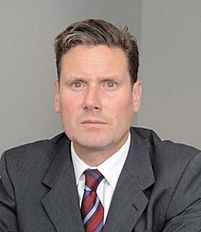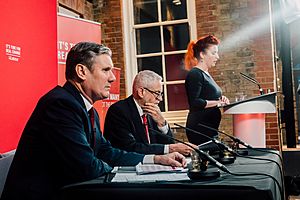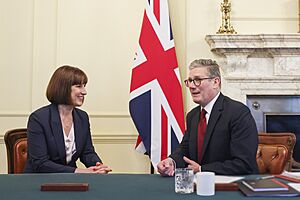Keir Starmer facts for kids
Quick facts for kids
Sir Keir Starmer
|
|||||||||||||
|---|---|---|---|---|---|---|---|---|---|---|---|---|---|

Official portrait, 2024
|
|||||||||||||
| Prime Minister of the United Kingdom | |||||||||||||
| Assumed office 5 July 2024 |
|||||||||||||
| Monarch | Charles III | ||||||||||||
| Deputy | Angela Rayner | ||||||||||||
| Preceded by | Rishi Sunak | ||||||||||||
| Leader of the Labour Party | |||||||||||||
| Assumed office 4 April 2020 |
|||||||||||||
| Deputy | Angela Rayner | ||||||||||||
| Preceded by | Jeremy Corbyn | ||||||||||||
| Leader of the Opposition | |||||||||||||
| In office 4 April 2020 – 5 July 2024 |
|||||||||||||
| Monarch |
|
||||||||||||
| Prime Minister |
|
||||||||||||
| Deputy | Angela Rayner | ||||||||||||
| Preceded by | Jeremy Corbyn | ||||||||||||
| Succeeded by | Rishi Sunak | ||||||||||||
|
|||||||||||||
|
|||||||||||||
| Assumed office 7 May 2015 |
|||||||||||||
| Preceded by | Frank Dobson | ||||||||||||
| Majority | 11,572 (30.0%) | ||||||||||||
| Director of Public Prosecutions | |||||||||||||
| In office 1 November 2008 – 1 November 2013 |
|||||||||||||
| Appointed by | Patricia Scotland | ||||||||||||
| Preceded by | Ken Macdonald | ||||||||||||
| Succeeded by | Alison Saunders | ||||||||||||
| Personal details | |||||||||||||
| Born |
Keir Rodney Starmer
2 September 1962 Southwark, London, England |
||||||||||||
| Political party | Labour | ||||||||||||
| Spouse | |||||||||||||
| Children | 2 | ||||||||||||
| Residences |
|
||||||||||||
| Alma mater | |||||||||||||
| Occupation |
|
||||||||||||
| Signature | |||||||||||||
Sir Keir Rodney Starmer ( keer; born 2 September 1962) is a British politician and lawyer who has served as Prime Minister of the United Kingdom since 2024 and as Leader of the Labour Party since 2020. He has been Member of Parliament (MP) for Holborn and St Pancras since 2015, and previously served as Leader of the Opposition from 2020 to 2024 and as Director of Public Prosecutions from 2008 to 2013. Starmer succeeded Rishi Sunak as Prime Minister of the United Kingdom following the Labour Party's victory at the 2024 general election.
Contents
Early life and education
Starmer was born in Southwark, London, on 2 September 1962. He grew up in the small town of Oxted in Surrey. He was the second of the four children of Josephine (née Baker), a nurse, and Rodney Starmer, who was a toolmaker. His mother had Still's disease. His parents were Labour Party supporters, and named him after the party's first parliamentary leader, Keir Hardie. He passed the 11-plus examination and gained entry to Reigate Grammar School, then a voluntary aided selective grammar school. The school was converted into an independent fee-paying school in 1976, while he was a student. Although he was exempt from paying fees until the age of 16, his sixth-form study fees were paid by a bursary he received from the private school's charity. Among his classmates were the musician Norman Cook, alongside whom Starmer took violin lessons; Andrew Cooper, who went on to become a Conservative peer; and future conservative journalist Andrew Sullivan. According to Starmer, he and Sullivan "fought over everything ... Politics, religion. You name it."
In his teenage years, Starmer was active in Labour politics; he was a member of the Labour Party Young Socialists in East Surrey. He was a junior exhibitioner at the Guildhall School of Music and Drama until the age of 18, and played the flute, piano, recorder and violin. Starmer studied law at the University of Leeds, graduating with first class honours and a Bachelor of Laws (LLB) degree in 1985, becoming the first member of his family to graduate. He undertook postgraduate studies at St Edmund Hall, Oxford, graduating from the University of Oxford as a Bachelor of Civil Law (BCL) in 1986. From 1986 to 1987, Starmer edited the radical magazine Socialist Alternatives.
Legal career
Starmer became a barrister in 1987 at the Middle Temple, becoming a bencher there in 2009. He served as a legal officer for the campaign group Liberty until 1990. He was a member of Doughty Street Chambers from 1990 onwards, primarily working on human rights issues. He has been called to the bar in several Caribbean countries, where he has defended convicts sentenced to the death penalty. He assisted Helen Steel and David Morris in the McLibel case, in the trial and appeal in English courts, also represented them at the European court. The case was seen as a David and Goliath case; a large team of leading lawyers represented McDonald's and the legal bills were estimated at £10m. By contrast Steel and Morris were denied legal aid; they acted on their own with help from lawyers including Starmer.
Starmer was appointed Queen's Counsel on 9 April 2002, aged 39. In the same year, he became joint head of Doughty Street Chambers. Starmer served as a human rights adviser to the Northern Ireland Policing Board and the Association of Chief Police Officers, and was also a member of the Foreign and Commonwealth Office's death penalty advisory panel from 2002 to 2008. He later cited his work on policing in Northern Ireland as being a key influence on his decision to pursue a political career: "Some of the things I thought that needed to change in police services we achieved more quickly than we achieved in strategic litigation ... I came better to understand how you can change by being inside and getting the trust of people". During this time he also marched and authored legal opinions against the Iraq War. In 2007, he was named "QC of the Year" by Chambers and Partners.
Director of Public Prosecutions

In July 2008, Baroness Scotland of Asthal, Attorney General for England and Wales, named Starmer as the new head of the Crown Prosecution Service (CPS) and Director of Public Prosecutions. He took over from Ken Macdonald on 1 November 2008. Macdonald, himself a former defence lawyer, publicly welcomed the appointment. Starmer was considered to be bringing a focus on human rights into the legal system.
Starmer left office in November 2013, and was replaced by Alison Saunders. After stepping down as Director of Public Prosecutions, Starmer was granted a tax-unregistered pension.
Early political career
Elected to the House of Commons at the 2015 general election, Starmer was appointed Shadow Minister for Immigration by new party leader Jeremy Corbyn in September 2015. He resigned in 2016 as part of the wider June 2016 British shadow cabinet resignations in protest at Corbyn's leadership, but accepted a new post under Corbyn later that year as Shadow Secretary of State for Exiting the European Union following the EU membership referendum. Starmer advocated a second referendum on Brexit, in which he stated he would vote to "remain"; this policy was ultimately included in the 2019 Labour election platform.

Leadership of the Labour Party
After Jeremy Corbyn resigned following Labour's 2019 general election defeat, Starmer won the party's 2020 leadership election. His leadership has been characterised by movement towards the political centre and abandonment of the left-wing platform of his leadership campaign, as well as by opposition to some of the government response to the COVID-19 pandemic and issues such as Partygate, the September 2022 mini-budget, and the cost of living crisis. Starmer has emphasised the importance of eliminating antisemitism in the Labour Party. In 2023, he set out five missions for a Labour government, targeting issues such as economic growth, health, clean energy, crime, and education. The party has seen varied results in local elections and by-elections under his leadership, but since late 2021 has maintained leads in opinion polling over the governing Conservative Party.
2024 general election
Starmer led his party in the 2024 general election, which he said was an "opportunity for change" and offered three reasons why voters should vote Labour, firstly to "stop the chaos", secondly "because it's time for change" and thirdly because Labour have "a long-term plan to rebuild Britain" that "is ready to go, fully-costed and fully funded." At the end of the campaign, Labour had a significant lead in polling over the Conservatives, and projections before the vote have indicated a landslide victory for Labour that would surpass the one achieved by Tony Blair at the 1997 general election. On 2 June, Starmer pledged to reduce record high legal immigration to the UK. Net migration to the UK was 685,000 in 2023.
On 13 June, Starmer released the Labour Party manifesto Change, which focuses on economic growth, planning system reforms, infrastructure, what Starmer describes as 'clean energy', healthcare, education, childcare, and strengthening workers' rights. It pledges a new publicly owned energy company, a 'Green Prosperity Plan', reducing patient waiting times in the NHS, and renationalisation of the railway network. It includes wealth creation and 'pro-business and pro-worker' policies. The manifesto also pledged to give votes to 16 year olds, reform the House of Lords, and to tax private schools, with money generated going into improving state education. At the end of the campaign on 3 July, Labour maintained their significant lead in polling over the Conservatives.
Premiership
Appointment

As the leader of the majority party in the House of Commons, Starmer was appointed as Prime Minister by Charles III on 5 July 2024, becoming the first Labour Prime Minister since Gordon Brown and the first one to win a general election since Tony Blair in 2005. He and his wife were driven from Buckingham Palace to Downing Street. Starmer stopped the car on the way back from the palace to go on a walkabout in Downing Street to meet cheering crowds.
In his first speech as Prime Minister, Starmer paid tribute to his predecessor, Rishi Sunak, saying "his achievement as the first British Asian Prime Minister of our country should not be underestimated by anyone" and he also recognised "the dedication and hard work he brought to his leadership", but added that the people of the UK had voted for change:
You have given us a clear mandate, and we will use it to deliver change. To restore service and respect to politics, end the era of noisy performance, tread more lightly on your lives, and unite our country. Four nations, standing together again, facing down, as we have so often in our past, the challenges of an insecure world. Committed to a calm and patient rebuilding. So with respect and humility, I invite you all to join this government of service in the mission of national renewal. Our work is urgent and we begin it today.
Other world leaders including Joe Biden and Justin Trudeau, as well as former Labour Prime Ministers Tony Blair and Gordon Brown, congratulated Starmer upon his appointment as Prime Minister. One of his first acts as Prime Minister was to declare that the Rwanda asylum plan as "dead": the Home Secretary, Yvette Cooper, would establish a Border Security Command to tackle smuggling gangs which facilitate illegal migrant crossings over the English Channel. Starmer went on a tour of the four nations of the UK, meeting with leaders including John Swinney, Michelle O'Neill and Vaughan Gething. He also met the twelve regional mayors and announced the establishment of the Council of the Nations and Regions. On 24 July 2024, Starmer attended his first Prime Minister's Questions in parliament.
Cabinet
Upon becoming Prime Minister, Starmer set about appointing a new Cabinet which first met the next day on 6 July, and he completed his ministerial appointments the following day, 7 July 2024. Parliament was then recalled to meet on 9 July.
Among Starmer's ministerial appointments were the scientist Patrick Vallance as Minister of State for Science, rehabilitation campaigner James Timpson as Minister of State for Prisons, Parole and Probation, and international law expert Richard Hermer as Attorney General for England and Wales, who were created Life Peers to sit in the House of Lords. The new government also contains a few ministers from the New Labour Blair/Brown governments, including Hilary Benn, Yvette Cooper, David Lammy and Ed Miliband in Cabinet, and Jacqui Smith and Douglas Alexander as junior ministers.
Domestic policy
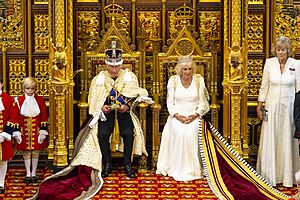
Domestically, Starmer said that his primary concerns would be economic growth, reforming the planning system, infrastructure, energy, healthcare, education, childcare and strengthening workers' rights, as set out in Labour's 2024 election manifesto.
The 2024 State Opening of Parliament outlined 39 pieces of legislation that Labour proposed to introduce in the months ahead, including Bills to renationalise the railways, to bring local bus services under local public control, to strengthen the rights of workers, to tackle illegal immigration, to reform the House of Lords, and undertaking a programme to speed up the delivery of "high quality infrastructure" and housing. In addition, a number of Bills proposed by the previous Conservative administration were also included, notably the Tobacco and Vapes Bill, which featured in the 2023 King's Speech, but had been abandoned when the election was called. Skills England, a body whose objective will be to reduce the need for overseas employees by improving skills training for people in England, was launched on 22 July.
Immigration
One of Starmer's first acts as Prime Minister was the cancellation of the controversial Rwanda asylum plan, describing it as "dead and buried". Cooper established the Border Security Command to tackle smuggling gangs which facilitate illegal migrant crossings over the English Channel.
NHS
On 11 September 2024, Starmer pledged that there would be no more money for the NHS without reform. In response to the report from a nine-week review conducted by peer and NHS surgeon Lord Darzi, which said that the NHS in England was in a critical condition, Starmer said the solution was reform, not money, and that there will be no more money without reform.
Prison overcrowding
Shortly after taking office, Starmer said that there were "too many prisoners", and described the previous government as having acted "almost beyond recklessness". In order to manage the prison overcrowding, newly-appointed Justice Secretary, Shabana Mahmood, announced the implementation of an early release scheme which allowed for prisoners in England and Wales to be released after serving 40% of their sentences rather than the 50% previously introduced under the last government. Over 1,700 prisoners were released in September, with further releases expected in the following year.
Two-child benefit cap
Starmer has refused to scrap the two-child benefit cap introduced by the Cameron–Clegg coalition government in 2013, citing financial reasons. On 23 July 2024, Labour withdrew the whip from seven of its MPs who had supported an amendment tabled by the Scottish National Party's Westminster parliamentary leader Stephen Flynn to scrap it, with Flynn saying that scrapping the cap would immediately raise 300,000 children out of poverty. MPs rejected the SNP amendment by 363 votes to 103. The seven Labour MPs suspended for six months were John McDonnell, Richard Burgon, Ian Byrne, Apsana Begum, Imran Hussain, Zarah Sultana and Rebecca Long-Bailey, all of whom now sit as independents. Starmer launched a Child Poverty Taskforce, in which expert officials from across government would work together on how best to support more than four-million children living in poverty.
Economy
The new Chancellor, Rachel Reeves, accused the previous government of leaving a £21.9bn "black hole", and announced on 29 July that certain winter fuel payments would be scrapped for around 10 million pensioners. Following criticism of the plan, Starmer has defended the scrapping of these winter fuel payments, arguing that he had to make "tough decisions to stabilise the economy". On 10 September, the Government benches defeated a Conservative Party motion in Parliament by a majority of 120 to block the measure.
Starmer's Labour Government inherited a number of ongoing industrial disputes from the preceding Conservative Government and agreed pay deals with trade unions representing NHS and railway workers, ending strikes in the first few months of taking office. In August 2024, Starmer's government agreed to increase public-sector worker pay by 5 to 7 per cent.
On 10 October, the Government implemented the most significant enhancement of employment regulations in a generation. This included an increase in minimum wages and a wide array of rights, such as immediate protection against unfair dismissal and the entitlement for employees to request flexible working arrangements, unless the employer can demonstrate that such arrangements are impractical. Billions worth of investments in emerging growth sectors including AI and life sciences, and infrastructure were unveiled by businesses and ministers at the government’s inaugural International Investment Summit on 14 October 2024. World-renowned CEOs and investors from around the world convened with ministers, First Ministers, and local leaders at the Guildhall in London.
The October 2024 United Kingdom budget was presented to the House of Commons by Chancellor of the Exchequer Rachel Reeves on 30 October 2024. She is the first woman to present a UK Budget, marking the Labour Party's first Budget in over 14 years. It covered Labour's fiscal plans, with a focus on investment, healthcare, education, childcare, sustainable energy, transport, and worker's rights enrichment. The National Minimum Wage is set to increase by 6.7% (reaching £12.21 per hour) and a £22.6bn increase in the day-to-day health budget was announced, with a £3.1bn increase in the capital budget. That includes £1bn for hospital repairs and rebuilding projects. The government plans to allocate £5 billion for housing investment in the fiscal year 2025–26, with a focus on enhancing the availability of affordable housing. Education will receive £6.7bn of capital investment, a 19% real-terms increase. This includes £1.4bn to rebuild more than 500 schools.
Foreign policy
United States

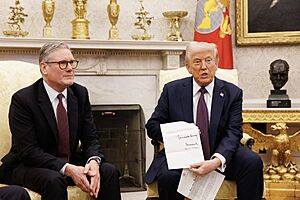
In July 2024, following the 2024 general election, US President Joe Biden congratulated Starmer on "a hell of a victory". Starmer and Biden discussed their shared commitment to the Special Relationship between the US and the UK, as well as mutual support of Ukraine.
In February 2025 Starmer met with President Trump at the White House to discuss continued support to Ukraine and a potential peace deal. They additonally discussed a potential trade deal. He also presented a hand written letter from King Charles III inviting the President to a historic second state visit to the UK.
NATO

The first overseas meeting Starmer attended as Prime Minister was the 2024 NATO summit held in Washington from 9 to 11 July 2024. On the flight to the summit, Starmer laid out a "cast iron" commitment to increase defence spending to the NATO target of 2.5% of GDP in line with the NATO target, following a "root and branch" review of British armed forces.
Europe
Since becoming Prime Minister, Starmer has sought to "reset" UK relations with the European Union following Brexit, which he opposed. He met with a number of European leaders during his first few months in office.
On 27 August 2024, Starmer and German Chancellor Olaf Scholz announced talks towards revising a Germany-UK co-operation agreement covering areas including defence, energy security, science and technology.
Israel-Hamas war
Starmer has pledged support for Israel in the war against Hamas, but has also called for an immediate ceasefire in the Gaza Strip since February 2024, having previously refused to call for one during his tenure as Opposition Leader. In July 2024, Starmer assured Israeli Prime Minister Benjamin Netanyahu that HMG would continue its "vital cooperation to deter malign threats" with Israel.
Under Starmer's premiership, licences of some British arms sales to Israel were suspended in September 2024 because of a "clear risk" the weapons could be used in breach of international law. Foreign Secretary David Lammy announced the UK Government's suspension of 30 out of 350 arms export licences to Israel, affecting equipment such as parts for fighter jets, helicopters and drones.
Personal life

Starmer met Victoria Alexander, then a solicitor, in the early 2000s while he was a senior barrister with Doughty Street Chambers when they were working on the same case. They became engaged in 2004 and married on 6 May 2007 at the Fennes Estate just north of Bocking, Essex. The couple have two children, a son, who was born a year after their wedding, and a daughter, born two years after that. Both are being brought up in their mother's Jewish heritage. Until moving in to Downing Street, the couple resided in Kentish Town, north London, where they own a townhouse.
Starmer is a pescatarian, and his wife is a vegetarian. They raised their children as vegetarians until they were 10 years old, at which point they were given the option of eating meat. In an interview during the 2024 general election campaign, Starmer said that his biggest fear about becoming Prime Minister was the impact it may have on his children, due to their "difficult ages" and how it would be easier if they were younger or older. During the 2024 general election campaign, Starmer said in an interview that he would try to avoid working after 6 p.m. on Fridays in order to observe Shabbat dinners and spend time with his family.
Starmer is an atheist, choosing to take a "solemn affirmation" (rather than an oath) of allegiance to the monarch. He has said that although he does not believe in God, he recognises the power of faith to bring people together. He also accompanies his family to services at the Liberal Jewish Synagogue in north London. Starmer is a keen footballer, having played for Homerton Academicals, a north London amateur team. He supports the Premier League football club Arsenal. Starmer has written a few articles for The Guardian and other newspapers including The Sunday Telegraph. From 1986 to 1987, Starmer served as the editor of Socialist Alternatives, a Trotskyist radical magazine produced by an organisation under the same name, which represented the British section of the International Revolutionary Marxist Tendency (IRMT).
Since September 2024, Starmer and his family have kept a Siberian kitten, named Prince, at 10 Downing Street.
Awards and honours
In 2002, Starmer took silk being appointed Queen's Counsel (now KC). Having received the Bar Council's Sydney Elland Goldsmith Award in 2005 for his outstanding contribution to pro bono work in challenging the death penalty in Uganda, Kenya, Malawi and the Caribbean, he was elected an Honorary Fellow of St Edmund Hall, Oxford in 2022.
For his meritorious "services to law and criminal justice", Starmer was knighted as a Knight Commander of the Order of the Bath (KCB) in the 2014 New Year Honours, enabling him to wear the Bath neck decoration on occasions such as Remembrance Sunday and the breast star at formal dinners when welcoming overseas dignatories.
| Date | School | Degree |
|---|---|---|
| 21 July 2011 | University of Essex | Doctor of university (D.U.) |
| 16 July 2012 | University of Leeds | Doctor of Laws (LL.D.) |
| 19 November 2013 | University of East London | Doctor of Laws (LL.D.) |
| 19 December 2013 | London School of Economics | Doctor of Laws (LL.D.) |
| 14 July 2014 | University of Reading | Doctor of Laws (LL.D.) |
| 18 November 2014 | University of Worcester | Honorary doctorate (D.Univ.) |
Starmer was sworn of the Privy Council on 19 July 2017, according him the honorific prefix of "the Right Honourable".
See also
 In Spanish: Keir Starmer para niños
In Spanish: Keir Starmer para niños
- The Starmer Project


